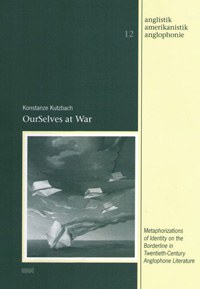Going Rogue with Baudrillard: A Radical Re-Assessment of War Literature
DOI:
https://doi.org/10.22029/ko.2010.570Abstract
Konstanze Kutzbach’s OurSelves at War takes up the task of formulating a post-critical theoretical framework for analysing the borderline negotiations of identity, and the gendered body in particular, in Anglophone war literature from 1898 to the end of the 20th century. Treating war as a “volatile and productive metaphorical site” (p. 3) rather than violent military confrontation in an empirical frame of reference, Kutzbach traces what she argues is a paradigm shift from a focus on representation in war literature, where war and the gendered body entail a more or less straightforward political and ideological metaphoricity (prior to the 1960s), to problematisations of “representability rather than representations of borderline experience of the subject imposed through war and death” (p. 151). Conversely, this paradigm shift overlaps with another one, from the juxtaposition of hero and enemy as subject and object/other, to an increased ambiguity between identity and alterity: “the development from literature whose protagonists tend to locate the perceived threat outside their own self to works which conceive of the source of this threat as originating in the self rather than an external force” (p. 7).

Downloads
Veröffentlicht
Ausgabe
Rubrik
Lizenz
Alle Beiträge (nicht die Buchcover) in KULT_online seit der 50. Ausgabe erscheinen unter der Lizenz Creative Commons Namensnennung 4.0. Die veröffentlichten Beiträge dürfen Sie unter den Bedingungen der Lizenz frei nutzen, insbesondere auch für kommerzielle Zwecke und durch Bearbeitung der Beiträge (allgemeinverständliche Fassung). Die Autor_innen von KULT_online haben der Zeitschrift die Veröffentlichung erlaubt und ihre Texte unter einer CC-BY-Lizenz veröffentlicht. Es findet keine exklusive Übertragung von Verwertungsrechten („copyright transfer“) an die Zeitschrift statt. Für die Buchcover gelten die urheberrechtlichen Bestimmungen des Verlages, bitte kontaktieren Sie das Verlagshaus für jede rechtmäßige Weiternutzung. Alle Beiträge der Ausgaben 1-49 sind online frei zugänglich und unterliegen den Nutzungsbeschränkungen gemäß des deutschen Urheberrechts



